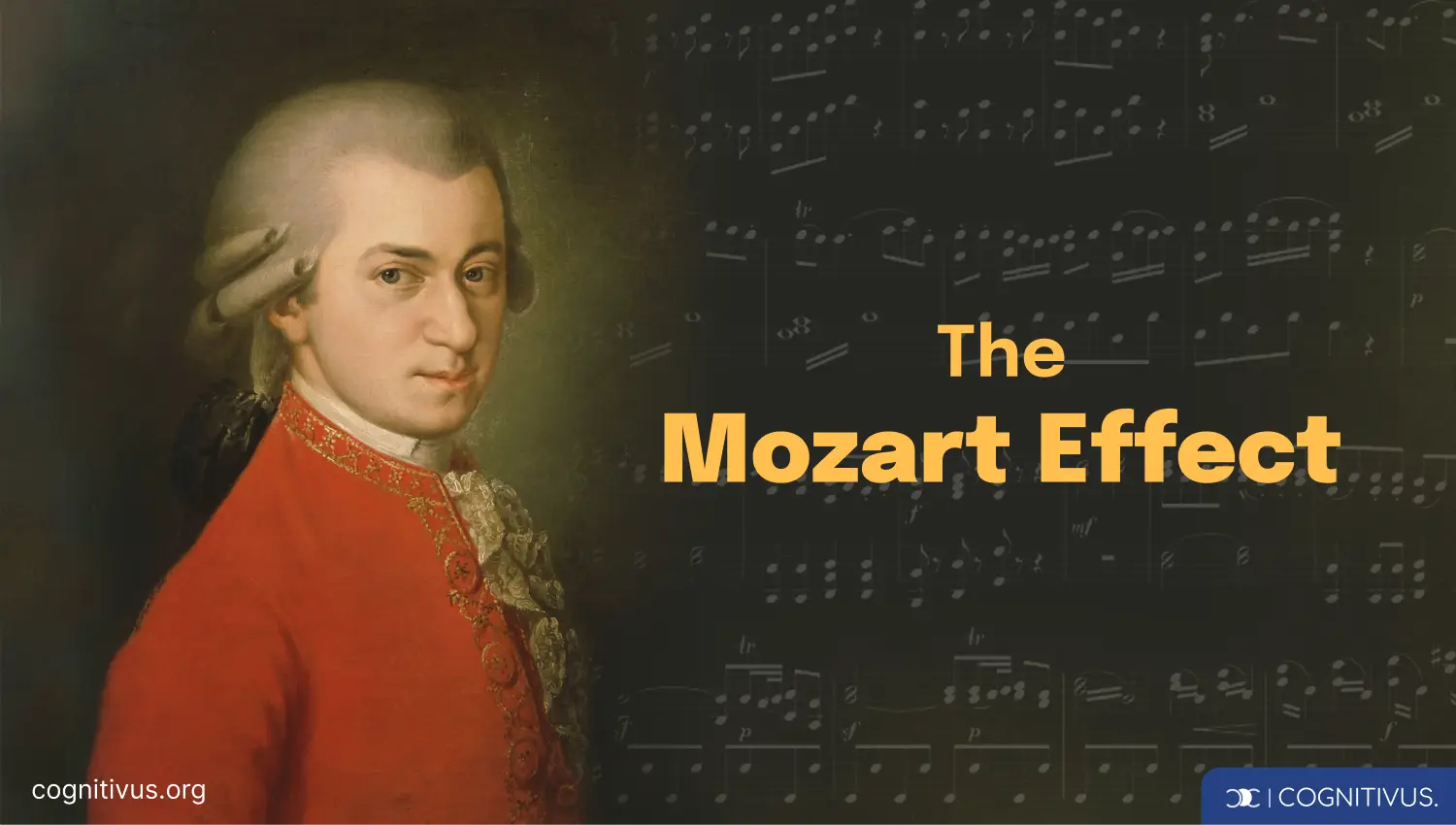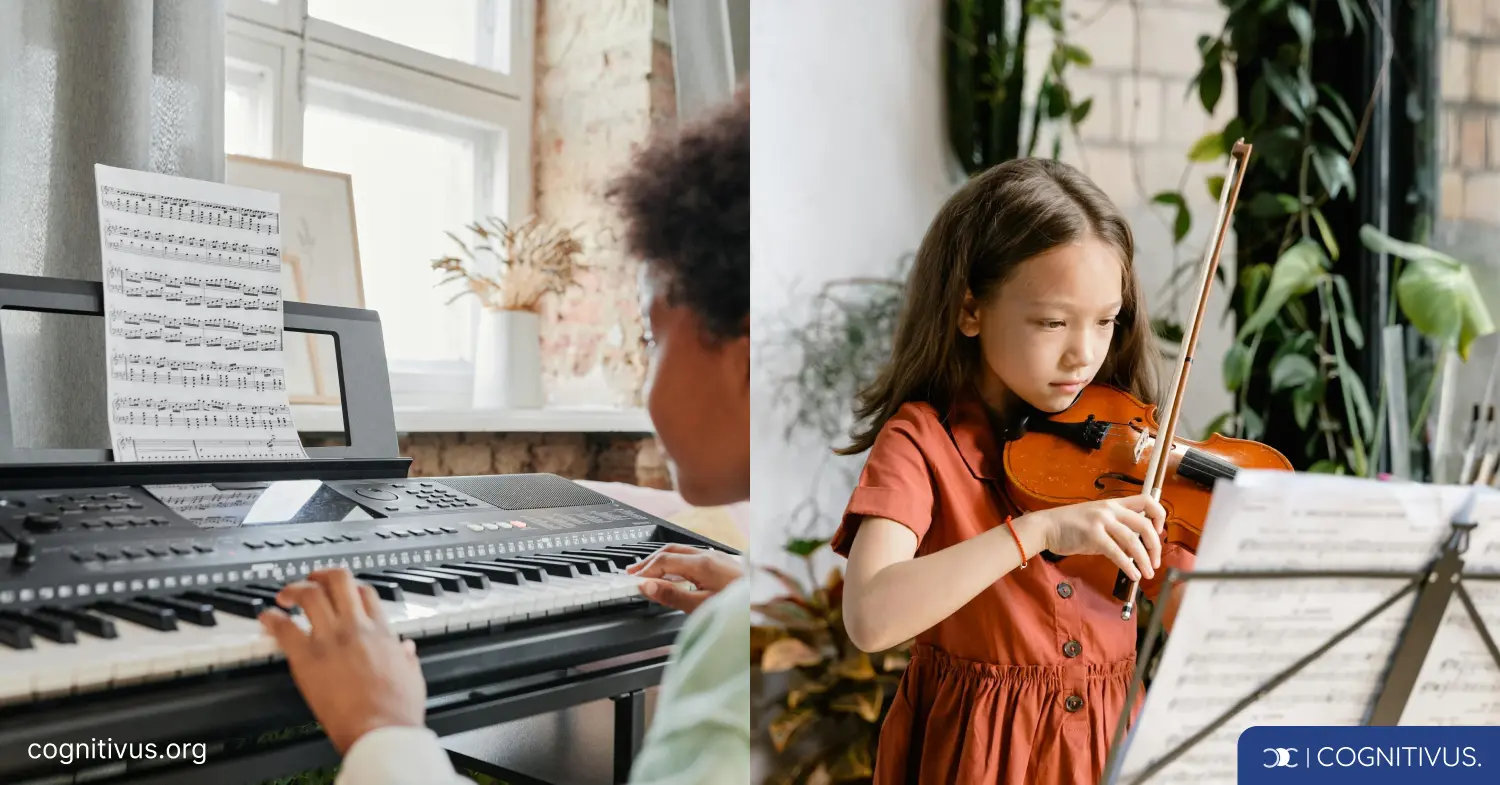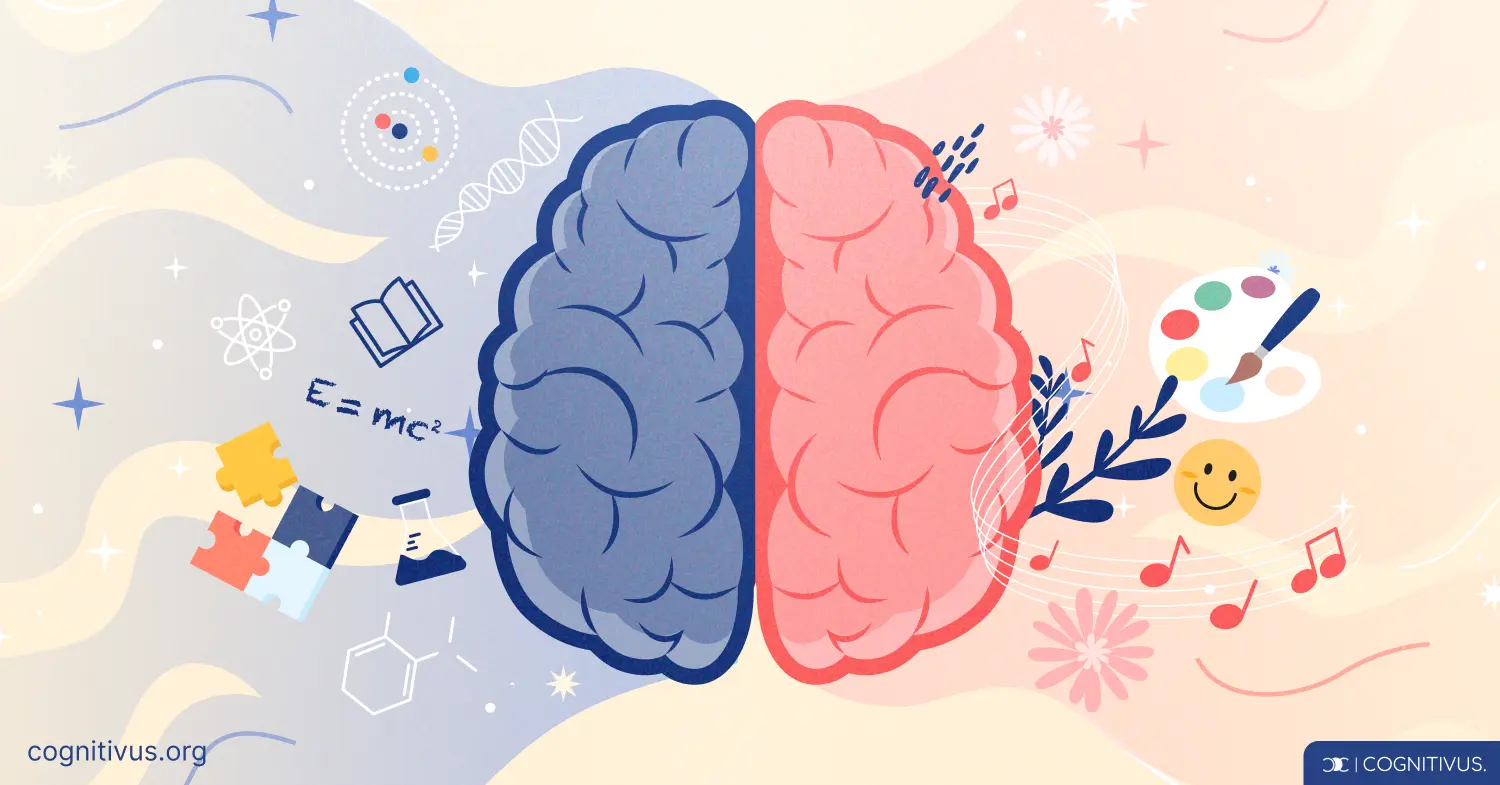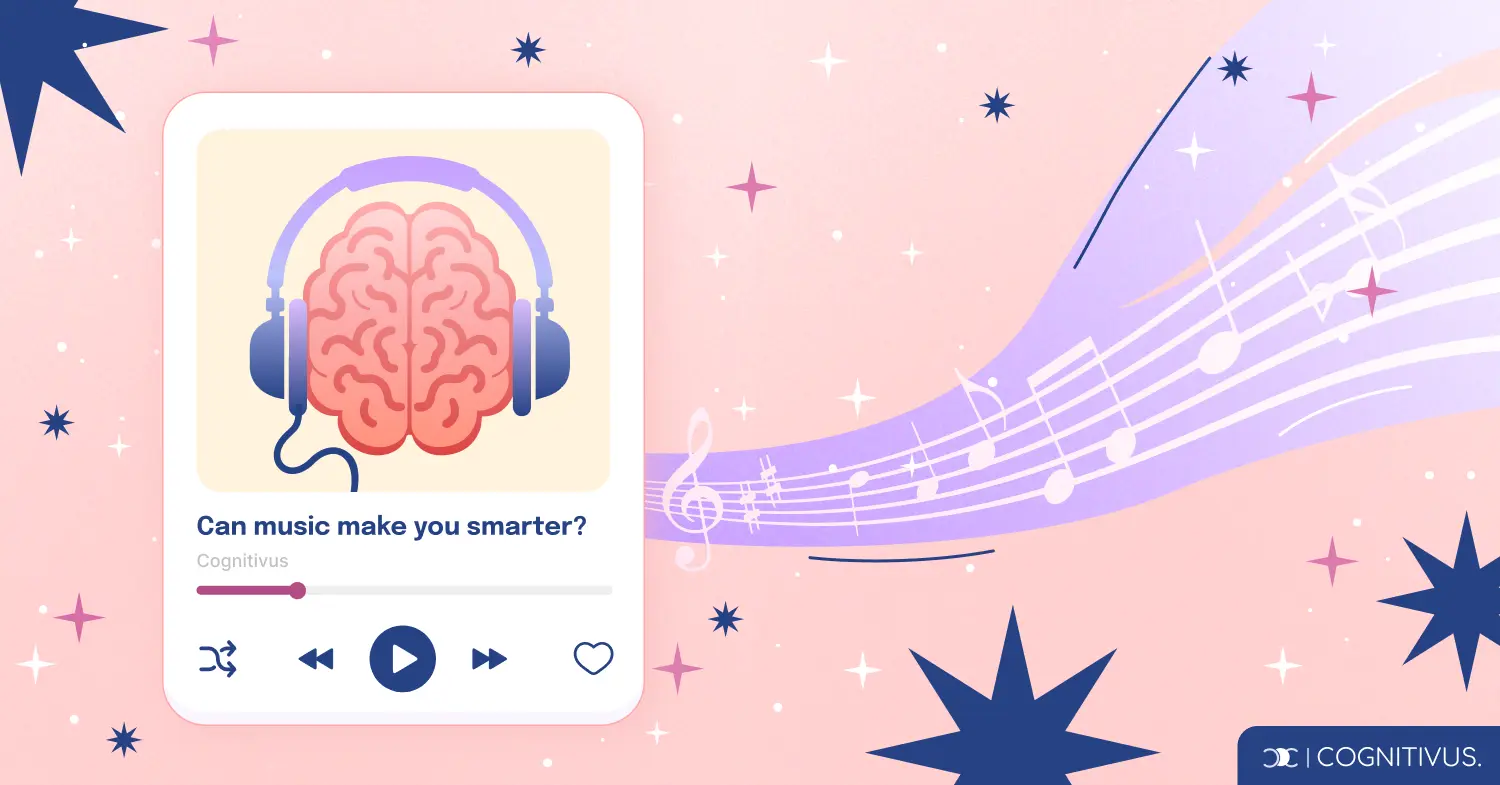There’s no denying that listening to music can lift our spirits and soothe our souls. I know that I’ve spent hours immersed in my favorite tunes, and it always makes me feel good.
Whether the sound of an orchestra or the beat of rhythm and blues, pleasurable music evokes a positive mood, from excitement to relaxation. But the real question is, does music make you smarter? In this article, I’ll unpack the amazing connection between music and IQ.
1. Can Music Truly Increase IQ?
We know that music touches our hearts, but can it really sharpen our minds?
Whether playing the piano or losing yourself in a Mozart symphony, can these musical activities change the way you learn and process information?
According to research, it can, but not the way you might think. Listening to music alone can’t make us more intelligent; however, playing a musical instrument from a young age or listening to background music while studying, can improve focus and memory.
Fascinating studies show that specific areas of the brain respond to musical stimuli by creating different psychophysiological reactions in men and women. To uncover the truth behind music and our IQ, we look at what research has to say, and that includes the ways the brain responds to musical activities.
Does music influence brain development?
You might be surprised to learn that musical training can shape the brain in many unique ways. For example, learning to play an instrument at an early age is associated with improved auditory processing. This means that it becomes easier for the brain to process and understand different sounds. It was Andrew E. Budson, MD, a lecturer in neurology at Harvard Medical School, who explained that auditory processing can boost your language skills. So what exactly does this mean? Well, when we engage with music, it stimulates parts of our brain responsible for memory, attention, and spatial-temporal skills that we use for problem-solving and planning.
The good news is that both listening to and playing music can refine these cognitive skills. Studies show that listening to relaxing background music activates parts of the brain that involve memory, and this further enhances your analytical skills.
There’s no doubt that engaging in music can build healthy cognitive abilities that help us make sense of the world around us. Think of playing a musical instrument like the guitar. Not only do you have to listen to the notes to play a melody involving auditory processing, but you also have to pay close attention to the strings using visual memory. At the same time, you’ll be picking up on patterns and rhythms to make compositions. Each of these actions uses different parts of the brain to play the instrument fluently.
It makes sense that, when it comes to music and intelligence, the improvements that we experience in our memory and problem-solving skills are related to performing specific musical tasks. It’s not a reflection of your overall intelligence or IQ, but it certainly plays a part in sharpening various intellectual abilities. So, while practicing scales or strumming a guitar might enhance particular skills, it's just one piece of the cognitive puzzle.
The Mozart Effect: Unveiling the truth
Have you ever heard of the Mozart effect? If you haven’t, it’s a theory that states that the more you listen to music by Mozart, the better you perform on IQ tests. This phenomenon was discovered in 1993 by the psychologist Frances Rauscher. The initial studies published in Nature suggested that listening to Mozart helped people perform on certain spatial reasoning tests.

But does this theory really hold true?
It turns out that while Mozart might give you a temporary edge in tasks that involve spatial intelligence, the boost is short-lived. At best, it might last about 15 minutes after you've stopped listening.
While I’d certainly like to believe that the effects of higher cognition and spatial awareness come from listening to music alone, the most substantial benefits for IQ stem from active engagement with music. You can develop your short-and long-term memory and problem-solving abilities when you participate in music. I’m not saying that Mozart’s compositions can’t be enriching. In fact, listening to a sonata can help you relax and unwind. But if you take up an instrument, it provides more cognitive improvements than listening to music alone.
2. The Impact of Music Education and Musical Training on Intelligence
Music education and training aren’t just about reading notes or learning to play an instrument; they’re about expanding your knowledge and academic achievements. Diving into the world of music through education and training can have a profound impact on your intelligence, so let’s look into the effect of music on the brain.
Music’s cognitive impact on the brain
To better understand the cognitive impact that music has on the brain, we have to look at it from a scientific perspective. A study conducted by Stanford University researchers used brain scans to show how music activates specific areas of the brain associated with concentration, memory, and prediction. Surprisingly, the silent moments between symphonies showed the highest levels of brain activity. This suggests that the brain relies on these types of pauses to process and organize information. In this sense, music has an evolutionary role because it allows us to anticipate and focus on incoming information and subsequent events.
Think of it this way: the predictable transitions in music help us understand how our brains examine and critically think about something, especially when we’re exposed to sensory information. So when we engage with music, we learn how to process unexpected and complex scenarios. This is an invaluable skill that we can apply academically and in our everyday lives.
Music lessons and IQ: connecting dots
We know that activities such as learning to play the piano, drums, or violin can develop our memory and focus, but how exactly do music lessons relate to IQ and our ability to learn new things? Findings from the American Psychological Association study revealed that both children and adolescents who received routine music lessons experienced increases in their IQ and overall academic performance. The longer they participated in the music program, the greater their cognitive benefits. Researchers noticed that their IQ scores appeared to rise, but the students who trained for years showed significant increases in their IQ.
I think you would agree that there’s more than just a slight connection between one’s intelligence and learning music. Regardless of background or economic status, there’s been a consistent link between music education and enhanced academic performance. Perhaps students who learn music develop sharper cognitive skills, or the challenge of the lesson itself maximizes intelligence. Either way, researchers believe that musical training is definitely a factor in shaping and developing children’s minds.
In the Journal of Educational Psychology, a study published in 2020 shed some light on the connection between music and intelligence in children. It showed how high school students in music education who played musical instruments actually scored higher grades in science, math, and English compared to their peers who did not participate in music classes. Even after other factors were accounted for, the findings remained unchanged. From this study alone, we can see that playing an instrument can foster various academic skills, from coordination and precision to social skills such as being a team player and active listening.
It’s easier to understand it this way: the sooner you take up music lessons or learn music at school, the more of a positive impact it will have on your musicality, overall intelligence, and grades. Music is much more than sheer entertainment. It has an undeniable intellectual influence as it strengthens neural pathways in the brain. In children, engaging with music facilitates neuroplasticity, which is the brain’s ability to change in response to learning new things. So, while listening to Mozart won’t make you a genius overnight, consistent and active musical training can sharpen your mental fortitude.
3. Do Musicians Have Higher IQs?
If playing an instrument and learning music can boost your cognition, then musicians must be exceptionally bright, right? But there might be more to this notion than what you and I believe. Let’s investigate the link between childhood musical training, IQ, and whether musicians are more intelligent than the average person.
Childhood musical training and IQ
To determine whether musicians are more astute, we need to look at the ways musical training influences intelligence, and it all starts in childhood. The University of Ulm in Germany conducted a study involving young boys who played musical instruments. They found that the boys displayed higher non-verbal intelligence and better spelling than those who didn’t play an instrument.
What is fascinating about these findings is that musical training enhanced the boys’ auditory skills and, in turn, improved their language abilities, particularly in phonetic languages such as German. Based on these results, it’s the practice of music that aids cognitive development rather than just having an interest in music.
These types of studies confirm that different music activities have unique effects on our mental development. We know that singing and early music exposure are beneficial for our mood; however, studies show that children who learn to play an instrument have better cognitive skills such as memory and language, which significantly improve their daily communication.
What is the best instrument to improve IQ?
Now that we know that musical instruments affect cognitive development, the question is whether you have to play specific instruments to achieve these results. The available research doesn’t focus on one type of instrument, but rather on the techniques that are involved in learning how to play them.
It appears that methods requiring complex coordination between the movements of your hand and reading music, such as with the piano or violin, influence the development of the brain. At the end of the day, it’s not really about the instrument but the time and complexity involved in training to play it.

In addition to learning how to play a musical instrument, studies tell us that the longer someone has played and practiced music, whether they’re a professional or not, the greater their performance in memory, concentration, and multitasking. It comes down to long-term engagement with music that works to keep the brain agile, and this enhances specific cognitive skills.
What is amazing about playing an instrument, is that you use different parts of your brain at the same time! That’s because you’re not only reading notes or moving your hands, but you’re also listening to the sounds you’re creating while changing your technique and collaborating with other musicians. Performing all these actions at once stimulates different ways of thinking, including problem-solving and prediction.
It is noteworthy that not all scientists agree that musical hobbies make students “smarter” in the traditional academic sense. In other words, it isn’t a one-way ticket to increasing one’s IQ scores on a test. Either way, it’s safe to say that music can support the development of the brain and it has a profound influence on emotional intelligence.
4. Is Classical Music Better for The Brain?
Based on what we know so far, music isn’t just a background track; it has an undeniable impact on the way our brain functions in addition to making us feel good.
One of the most popular genres of music that is associated with sharpening your mental skills is classical music. Whether Beethoven’s piano sonatas or Vivaldi’s orchestras, these mesmerizing compositions are known to activate certain parts of the brain. These include memory, attention, and task switching. There is some evidence to support the fact that our ability to understand and appreciate classical styles of music could refine cognitive skills associated with higher IQ levels.
But don’t worry; this doesn’t mean that other types of music can’t help boost your intelligence. There is research that shows that enjoying your favorite music can support your mental health and functioning. From your preferred rock beats to jazz, tunes that make you feel happy can ignite creativity along with problem-solving and innovative ways of thinking.
Classical music can provide a multitude of intellectual benefits, but the genre of music might not be as important as the emotional connection that we feel. From classic to pop, if music stirs something in you, it’s got to be doing something good for your brain.
5. Does Music Boost Emotional Intelligence and Creativity?
Listening to music that you like, can instantly transform your mood and help you cope with challenges in your life. I know that music has been an integral part of my emotional journey, taking me from moments of anxiety to peace, but why does it have such an impact on our emotions?
When we experience music, we develop emotional awareness and regulation, and we learn how to stabilize our mood. Music that resonates with us helps us strengthen our sense of empathy as we connect to the lyrics or the melody of a song or composition.
In addition to igniting our emotions, music creates a physical response that can reduce stress on the autonomic nervous system, which further assists in regulating our emotions.
With so many powerful influences on our emotions, it’s no wonder that music can boost our emotional intelligence, which is more and more believed to be more important than IQ.
But what about our creativity? Remember that your ability to be creative and come up with ideas involves emotional insight and cognitive skills. Listening to the right soundtrack can elevate your mood and help you think outside of the box. That’s because the more you stimulate your senses with music, the more it strengthens the networks in your brain that are part of creativity and ideation.
Let’s take the example of listening to joyful music. Uplifting sounds can support independent ways of thinking in both art and science. However, it may not have the same effect when it comes to linear or convergent thinking, which means coming up with one solution to a problem. So we can safely say that music sparks creativity but doesn’t necessarily assist in finding a single, correct answer to an issue or challenge. For more analytical and convergent thought processes, you would rely on your general intelligence, not your creativity.

What We Can Conclude About Music and Intelligence
When you think about music and intelligence, I hope that you experience your favorite tunes in a whole new light. In all of its forms, music can enrich us mentally and emotionally. We know that activities, like learning to play a new instrument, can build and enhance the way we process information or solve problems.
It deepens our emotions and broadens our creativity, and that’s true for both children and adults. So, while music may not directly increase your IQ score on a test, it does shape your mind and soul in ways that you might not be fully aware of. Here’s to music and making you a more insightful, creative, and intelligent individual.


